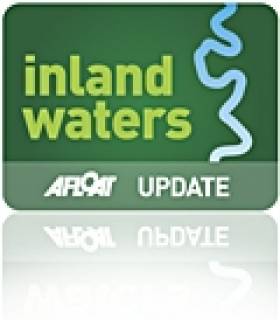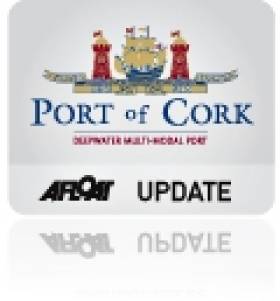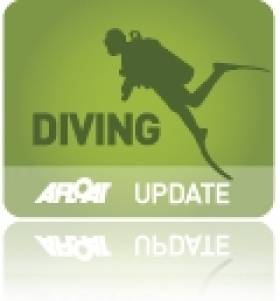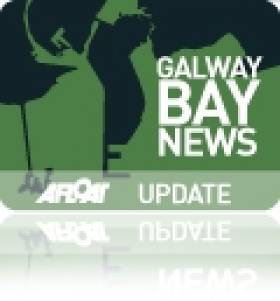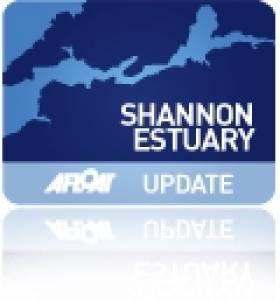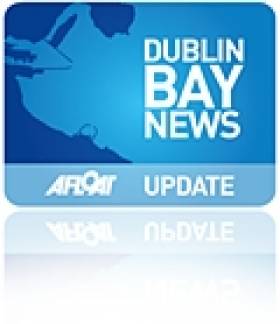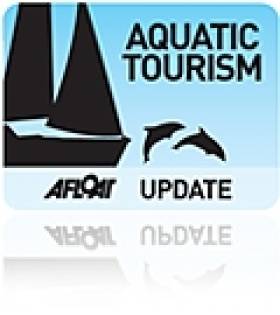Displaying items by tag: tourism
IFI Completes New Cross-Border Angling Project in Leitrim
#InlandWaterways - Inland Fisheries Ireland (IFI) marked the completion of an angling development project under the Interreg IVA Cross Border Harnessing Natural Resources Programme in Co Leitrim today (Friday 22 March).
The IFI project incorporated the development of angling facilities at two locations - Acres Lake in Drumshanbo and Herons Shore on Lough Allen - with the aim of harnessing the nature-based tourism potential of the region and fostering cross-border economic development.
IFI upgraded existing car parks and added additional car parking spaces, angler access points, information signage and floating fishing stands.
Speaking at the ribbon cutting ceremony, IFI board chair Brendan O’Mahony said: "The essential investment in programmes such as this one ensures the long-term sustainability of angling amenities for Ireland. It increases visitor numbers which in turn provides job opportunities and revenue for local communities.
"It also raises the standard of the angling experience for all levels of angler and ensures that the resource is accessible for all to enjoy”.
O’Mahony also commended the commitment of the drivers of such projects and their vision.
Recognising that the phase completed by IFI is only one part of the overall programme, IFI director Amanda Mooney commented that the fisheries body was "delighted to be given the opportunity to be part of the overall Harnessing Natural Resources Programme" and wished success to partner agencies on their own projects.
Public Consultation On Future Of Bantry Bay Harbour
#IrishHarbours - The Department of Transport, Tourism and Sport (DTTAS) is asking members of the public and all interested parties for their views on plans to merge Bantry Bay Harbour with the Port of Cork Company.
The department believes that the future of Bantry Harbour would best be secured through a merger, and is seeking views on the proposals by 5 April.
Government policy is to merge harbours with significant commercial traffic with a port company, and to transfer smaller harbours to a local authority. To date 11 harbours have transferred to local authority control. Bantry Bay Harbour is now the only regional harbour operating under the Harbours Act of 1946.
A Review of Regional Ports and Harbours in 1999 recommended that Bantry Bay Harbour Authority should merge with the Port of Cork company, on the grounds of good governance.
The core business of Bantry Bay Harbour is the oil storage and transhipment terminal on Whiddy Island. Aquaculture, fishing and tourism are also prevalent in the harbour and a small number of cruise liners visit the harbour each year.
Amalgamation with the Port of Cork would provide access to port expertise, marketing, strategic development planning and the skills required for the regulation of navigation, ship and port security requirements, pilotage, safety, emergency response, and pollution.
The Port of Cork currently provides this professional expertise through the provision of harbourmaster services, on a contractual basis, to bring in large oil tankers and cruise liners into the bay. This is an absolute requirement to operate business in Whiddy to help mitigate the risks of maritime accidents and environmental damage.
Should the transfer take place to the Port of Cork, there is an opportunity for the port to provide local representation to Bantry Bay and some investment back into the harbour. The opportunity also exists for the Port of Cork and the local authority to co-operate with regard to the future development of the harbour.
Dive Ireland 2013 Is 'Huge Success'
#Diving - The Irish Underwater Council (CFT) reports the "huge success" of the 22nd annual Dive Ireland expo in Athlone at the weekend.
The two-day event at the Hodson Bay Hotel welcomed "speakers from near and far as well as photography workshops and a fully loaded international trade fair" - not to mention the CFT National Dive Conference and AGM.
Ahead of the expo, Minister for Arts, Heritage and the Gaeltacht Jimmy Deenihan commented on the role of SCUBA clubs and diving centres in Ireland's national tourism infrastructure in promoting this country's dive sites.
In the foreword to the recently published Warships, U-boats and Liners, he also wrote of the Government's commitment to developing its archive of wrecks in Irish waters.
“With the support of responsible dive centres and local dive clubs ... these wrecks can be explored now and into the distant future by visitors from home and abroad.”
According to the CFT, local authorities are also starting to recognise the importance of developing aquatic activities to encourage tourism.
One example is Mayo County Council's Blue Ways list of swimming and snorkelling sites along the county's coast, which complements its Green Ways walking trails.
The council also highlighted the importance of heritage among Ireland's diving community, and their role in discoveries such as the Viking-era swords retrieved from the River Shannon near Banagher last autumn, as the Offaly Independent reports.
Whale Watch Tour Firm Gets Digital Boost
#Business - A West Cork whale watching tour operator has been announced as the third winner of the Eircom Digital Boost initiative for 2013, as Business & Leadership reports.
Union Hall-based Whale Watch West Cork now has the opportunity to redesign its website, and also wins a strategy day with digital and marketing experts from the Eircom Expert Panel to provide consultation specific to their business, plus a place on the SureSkills Diploma in Digital Marketing and a telecoms package for one year, all to the value of €10,000.
Established by conservationist Nic Slocum, the small business is one of most popular operators in the region in an industry that has become a major tourism magnet since the Government declared our coastal waters as a whale and dolphin sanctuary in the early 1990s.
Operating the company for a decade, Slocum says his business "is currently 75% reliant on the internet so improving our online and social media presence is hugely important."
He added: "By having an up-to-the-minute digital strategy and a stronger online presence, we'll be in a much improved position to broaden our customer base and we are very excited about getting on with it now and implementing our new and improved global online strategy."
Gary Disley, marketing director with Eircom Business and a member of the Digital Boost Expert Panel, said that the Whale Watch West Cork team "have a huge passion for whale and dolphin conservation and know what whale watchers want. Winning Eircom’s Digital Boost will practically equip Nic and his crew to maximise their potential and help them build the business."
Digital Boost is Eircom’s initiative to help SME owners increase their digital presence and maximise their online potential. The scheme offers practical guidance and tips to boost online enterprise, and is to open to all small and medium business owners, with or without an online presence.
Protest in Galway Over Fish Farm Plans This Weekend
#Fishfarm - Galway Bay FM reports that a major protest is set to take place in Galway this weekend against the proposed deep sea fish farm off the Aran Islands.
Galway Bay Against Salmon Cages is organising the demonstration from Eyre Square on Saturday 2 March at noon in opposition to the 500-hectare organic salmon farm proposed by Bord Iascaigh Mhara (BIM).
The facility, to be located off Inis Oírr in Galway Bay, would be the largest of its kind in Europe and would double the State's production rate of organic salmon, cited by BIM as Ireland's leading organic food export.
However, the scheme has been facing strong opposition from fisheries groups and local anglers citing the potential environmental impact on wild salmon numbers and the threat to tourism in the area.
Inland Fisheries Ireland is among those bodies that have expressed concern over the fish farm plans, citing research on the effect of sea lice emanating from aquaculture facilities on the mortality rate of wild Atlantic salmon.
BIM responded to news of the protest by stating such action may be unnecessary due to the appeal mechanism available in the State's decision process.
Master Plan for Shannon Estuary Launched
#Shannon - The Shannon Foynes Port Company has launched its master plan for the development of port infrastructure and services along the Shannon Estuary.
RTÉ News reports on the 30-year plan, titled Vision 2041, which will involve the construction of a new deepwater birth at Foynes, the development of warehousing and facilities across 300 acres of additional land - and the potential reopening of the Foynes-Limerick railway line, which has lain dormant since 2001.
As one of the deepest waterways in Europe, the estuary is also in prime position to take advantage of the new 'post-panamax' supertanker shipping era, and talks on securing future foreign direct investment as a priority.
As previously reported on Afloat.ie, submissions for the accompanying strategic plan for the development and management of marine-related industry and tourism in the Shannon Estuary region closed last week.
The Draft Strategic Integrated Framework Plan (SIFP) for the Shannon Estuary, the first of its type to be developed in Ireland, identifies a number of strategic sites along the estuary for future possible development in the areas of industry, tourism, energy, fishing and aquaculture and marine-related industry.
Irish Harbours Get €7.4m Funding for Remedial Works
#IrishHarbours - Funding of €7.4 million for urgent remedial works at six regional harbours has been announced by Minister for Transport, Tourism & Sport Leo Varadkar.
The funding will pay for repairs and safety works on essential harbour infrastructure, and is likely to benefit the local economy, promote leisure activities and support the fishing industry.
“This funding will allow essential works at these regional harbours on piers, walls and harbour structures," said the minister. "This work is necessary as part of their transfer from central Government to local authority control.
“Harbours play an important role in their communities in terms of fishing, cargo and leisure and play an increasingly important role in tourism and watersports."
Minister Varadkar added: "The large-scale safety or construction projects planned for Kinsale, and for Baltimore & Skibbereen Harbour this year will be able to go ahead thanks to this funding. Smaller scale projects at other harbours can also proceed, including essential works at Arklow Harbour.”
The funding has been allocated to the following harbours:
Arklow - €3,588,000
Baltimore & Skibbereen - €1,165,000
Bantry Bay - €100,000
Kinsale - €1,467,000
Tralee & Fenit - €750,000
Wexford - €329,500
The funding has been concentrated on remedial works to ensure that the harbours are in a fit condition during their transfer to local authority control.
Twelve of the 13 regional harbours have transferred to date, with 11 being taken over by local authorities, and one designated a fisheries harbour.
Local Stakeholders Voice Upset at Howth Parking Charge Plans
#Howth - A new website has been set up outlining opposition by local traders and stakeholders to proposals to charge for parking in Howth Harbour.
As previously reported on Afloat.ie, Dublin North East TD Tommy Broughan slammed the proposals by the Department of Agriculture, Food and the Marine as "crazy" and potentially devastating for Howth's marine and tourism businesses.
Some 500 parking space are available in Howth village, which Minister of State Jimmy Deenihan has argued are being predominantly used by park-and-ride commuters.
In response to a question from Deputy Broughan in late December, Marine Minister Simon Coveney added that "the volumes of traffic currently parking at the fishery harbour, both during the working week and at weekends, are creating significant health and safety risks, to the extent that on some occasions access for emergency service vehicles is compromised."
At a meeting called by the Howth Chamber of Commerce on Monday 28 January, Howth Yacht Club Commodore Breda Dillon rejected that assessment, claiming that overcrowding was not an issue, and that on normal days there was only 10% occupancy of parking spaces on the middle pier.
Her sentiments were echoed by the majority in attendance, with area TDs and representatives of local business all referencing the potentially damaging effects that parking charges would have on the village economy. Click HERE for more on the story.
TD Slams 'Crazy' Howth Parking Charge Proposals
#Howth - "Disastrous" could be the effect for Howth's economy if car parking charges proposed by Government are introduced, as The Irish Times reports.
Tommy Broughan, Labour TD for Dublin North East, hit out at plans to charge for parking in the harbour area of the North Dublin fishing village, describing them as "crazy" and potentially devastating for Howth's marine and tourism industries.
He also criticised the failure of Marine Minister Simon Coveney and his department to consult with local stakeholders before pressing forward with the plans.
However, Minister of State Dinny McGinley argued that the vast majority of the 500 spaces available in Howth village were being used by park-and-ride commuters, and that only a small number of users involved in the fishing industry were effectively funding the service for all.
The Irish Times has more on the story HERE.
Sligo's Seaweed Spa A Hit With Locals and Tourists Alike
#Tourism - How's this for a unique winter break in Ireland - a visit to a century-old seaweed bathhouse in Sligo, anyone?
That's what Guardian writer Nick Fisher did recently when he and his family spent a week in the north-west to partake of Kilcullen's Seaweed Baths, right next to the shore at Enniscrone beach.
Angling is the big tourism draw for the region, now that the salmon season is well underway, with the River Moy providing all the sport a caster could want at any level.
But it's the seaweed baths - fed with water and fresh seaweed from Enniscrone Bay - that put a unique stamp on the whole experience, according to Fisher.
"People with skin conditions... as well as sportsmen and women love these baths," he writes. "Many of the local pensioners have season tickets ('To warm their old bones in the winters') and I'm told it is a very popular hangover cure.
"After the hot silky seaweed soak, the stinging, cleansing, pins-and-needles of the cold seawater shower leaves a bather feeling newly minted."
The Guardian has more on the story HERE.


























